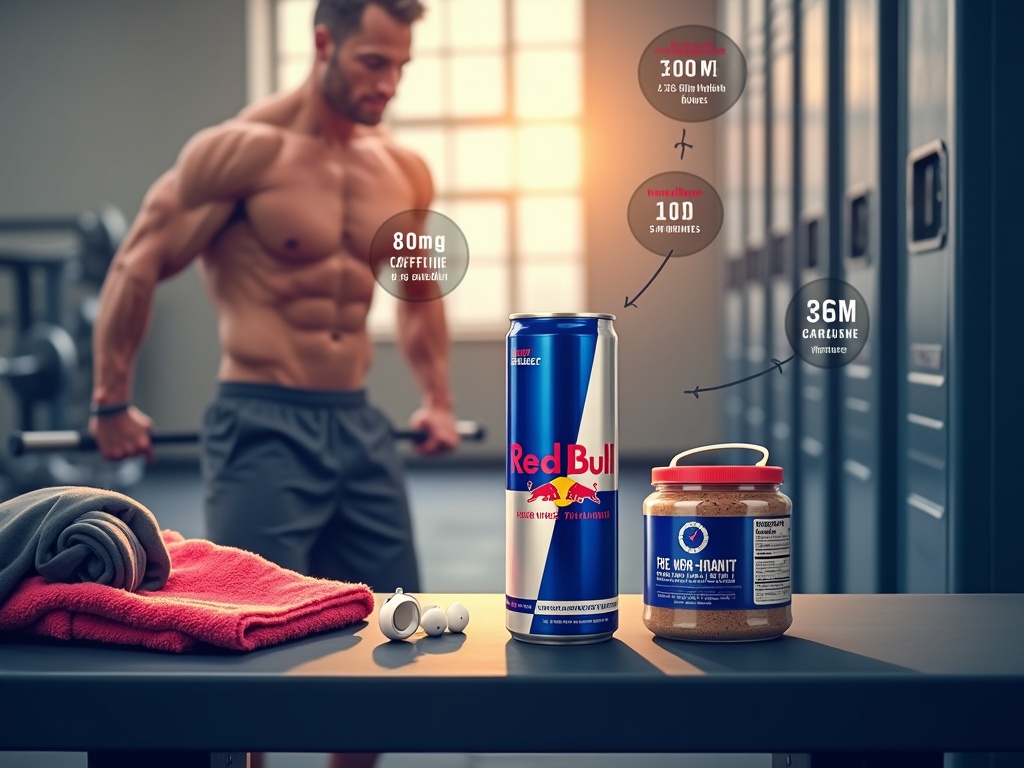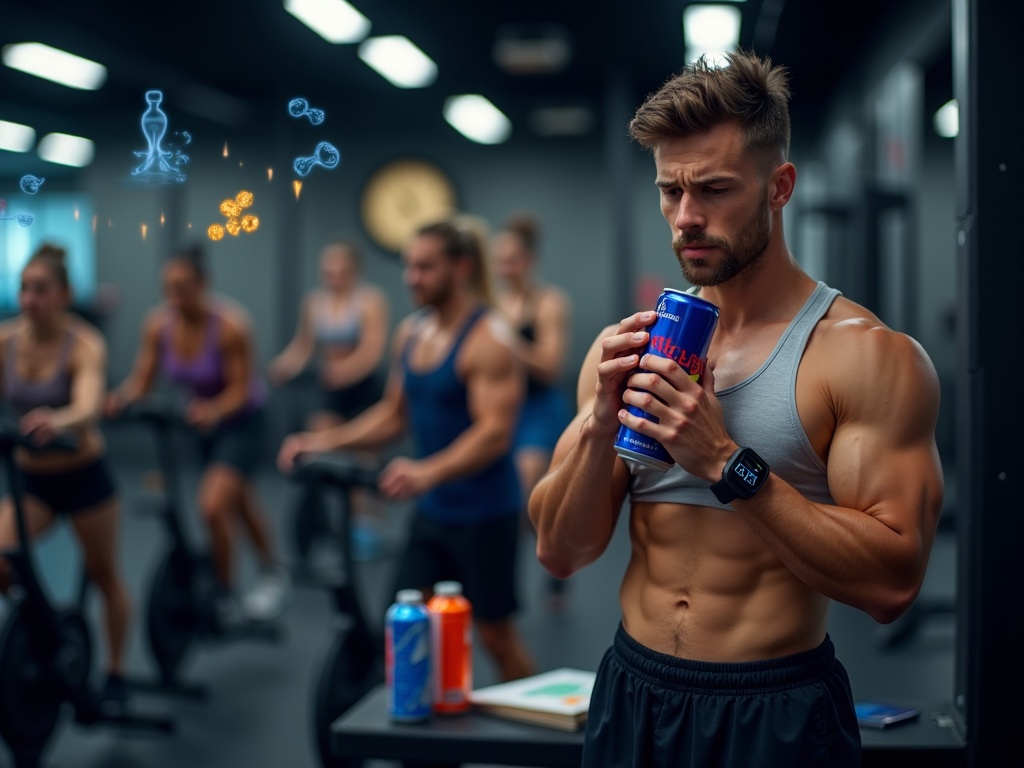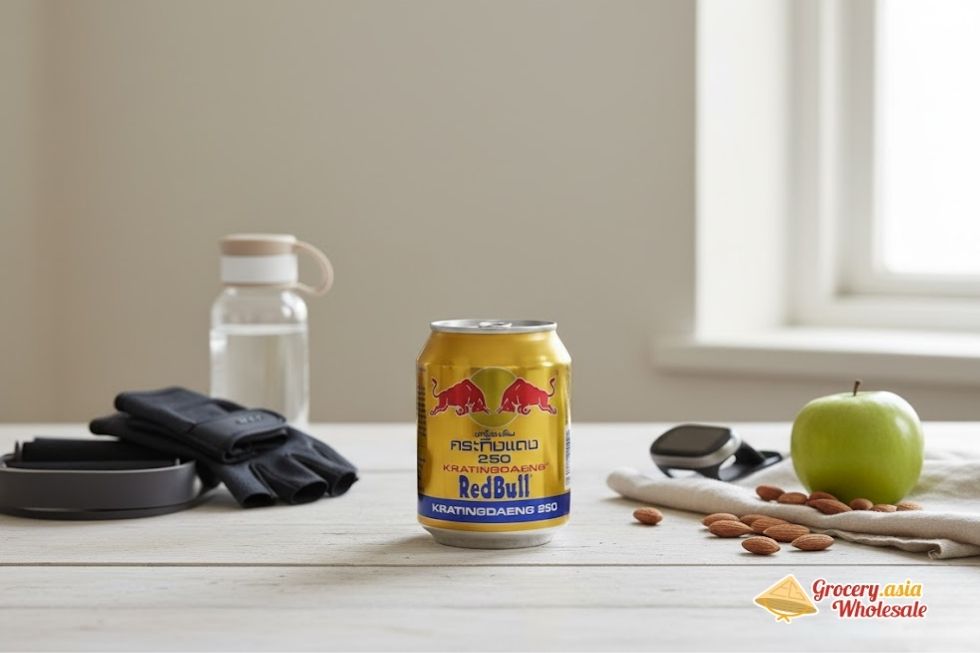No products in the cart.
Beverages News, Energy Drinks, Red Bull Energy Drink
Is Red Bull Energy Drink Good For You Before Gym
Red Bull delivers a modest caffeine boost for gym sessions with 80mg of caffeine per can, but its 27 grams of sugar can trigger energy crashes that sabotage workout performance. The drink offers convenience and contains some beneficial ingredients like taurine and B vitamins, though dedicated pre-workout supplements typically deliver superior results with higher caffeine doses and performance-specific compounds.
Table of Contents
Key Takeaways
- Red Bull contains only 80mg of caffeine per can, which falls short of the research-recommended 3-6mg per kilogram of body weight for optimal performance enhancement.
- The 27 grams of sugar in regular Red Bull can cause energy crashes 30-60 minutes after consumption, potentially disrupting your workout when sustained energy is needed most.
- Red Bull Sugar-Free eliminates the crash factor but relies on artificial sweeteners, making it a better option for sustained physical activity.
- Consume Red Bull 30-45 minutes before exercise for peak caffeine absorption, but avoid it within 6 hours of bedtime to protect sleep quality.
- Dedicated pre-workout supplements typically offer better value with higher caffeine content, performance-enhancing ingredients like beta-alanine and L-citrulline, and fewer calories than Red Bull.
For those seeking more effective pre-workout support, exploring alternatives like dedicated supplements may provide significant benefits. These often contain researched doses of ergogenic compounds and fewer sugars. For more information on how caffeine and supplements affect exercise performance, visit resources like the Examine.com database of nutrition science.
The Truth About Red Bull as a Pre-Workout Drink
I often get asked whether Red Bull makes an effective pre-workout option, and the answer isn’t as straightforward as you might think. While this popular energy drink contains several ingredients that can enhance athletic performance, the dosages don’t always align with what research suggests for optimal results.
Caffeine Content and Performance Benefits
Red Bull’s caffeine content sits at 80mg per 8.4oz can, which equals roughly the same amount you’d find in a small cup of coffee. Caffeine stands as one of the most well-researched ergogenic aids available, proven to enhance alertness, reaction time, and endurance during exercise sessions.
The mechanism behind caffeine’s effectiveness involves blocking adenosine receptors in your brain. Adenosine naturally accumulates throughout the day and makes you feel tired, so when caffeine blocks these receptors, it reduces fatigue sensations and helps you feel more energized. However, research indicates that optimal caffeine dosage for performance enhancement ranges from 3-6mg per kilogram of body weight. For a 70kg person, this translates to 210-420mg of caffeine — significantly more than what a single Red Bull provides.
I find that many athletes would need to consume 2-3 cans to reach the lower end of this effective range, which brings other considerations into play. The sugar content in Red Bull becomes a factor when consuming multiple cans, potentially causing digestive discomfort during intense workouts.
Additional Ingredients and Their Effects
Additional ingredients in Red Bull offer varying degrees of benefit for pre-workout consumption. Taurine, present at 1000mg per can, may help reduce muscle damage and support cardiovascular performance during exercise. Research on taurine’s effects remains mixed, with some studies showing modest improvements in exercise capacity while others demonstrate minimal impact.
B vitamins included in the formula — specifically B3, B5, B6, and B12 — play crucial roles in energy metabolism. These vitamins help convert carbohydrates and fats into usable energy, but they provide limited performance benefits unless you’re already deficient in these nutrients. Most people with balanced diets already consume adequate B vitamins through food sources.
Pre-Workout Timing and Duration
Timing becomes crucial when using Red Bull as a pre-workout drink. I recommend consuming it 30-45 minutes before exercise to allow sufficient time for caffeine absorption and peak blood levels. The duration of Red Bull’s effects typically lasts 3-5 hours, making it suitable for longer training sessions.
Cost, Convenience, and Practicality
The convenience factor makes Red Bull appealing compared to mixing powdered pre-workout supplements. You can grab a can and consume it anywhere without preparation or cleanup. However, cost considerations come into play — Red Bull typically costs more per serving than dedicated pre-workout supplements that provide higher caffeine doses and additional performance-enhancing ingredients.
I’ve observed that Red Bull works best for moderate-intensity workouts or when you need a quick energy boost rather than for high-intensity training sessions requiring maximum performance enhancement. The relatively low caffeine content makes it suitable for caffeine-sensitive individuals or those exercising later in the day who want to avoid sleep disruption.
Final Thoughts
Understanding Red Bull’s complete ingredient profile helps you make informed decisions about incorporating it into your fitness routine. While it contains some beneficial compounds for exercise performance, dedicated pre-workout supplements typically offer more comprehensive formulations designed specifically for athletic enhancement.
For occasional use or lighter workouts, Red Bull can serve as an acceptable pre-workout option. Athletes seeking maximum performance benefits might find better value in purpose-built pre-workout supplements that deliver optimal ingredient dosages based on scientific research.

Sugar Content: The Downside of Red Bull Before Exercise
I’ve discovered that a regular 8.4oz Red Bull packs a surprising 27 grams of sugar—equivalent to roughly seven teaspoons—along with 110 calories. This amount actually exceeds the American Heart Association’s daily sugar recommendation for women, which sits at 25 grams, and covers 75% of the 36-gram limit suggested for men.
The timing of this sugar intake becomes particularly problematic when you’re planning a workout. Sugar in Red Bull delivers that familiar quick energy spike, but what follows can derail your exercise routine entirely. The inevitable crash that occurs 30–60 minutes later may leave you feeling sluggish and drained right when you need sustained energy most during your workout.
These calories represent what nutritionists call “empty calories”—they burn fast but provide zero nutritional value compared to whole food sources. Your body processes this refined sugar rapidly, causing blood glucose levels to spike and then plummet. During exercise, this rollercoaster effect can significantly impact your performance and endurance.
The Sugar-Free Alternative and Its Trade-offs
Red Bull offers a Sugarfree version that contains only 5 calories and 0 grams of sugar, using artificial sweeteners aspartame and acesulfame-K instead. This option eliminates the crash factor that regular Red Bull creates, making it more suitable for sustained physical activity.
However, the sugar-free version introduces different considerations:
- Digestive sensitivity in some people due to artificial sweeteners
- Preference for natural ingredients leading others to avoid synthetic compounds
- Lack of quick glucose boost needed for high-intensity workouts
I’ve found that individual tolerance varies significantly—some athletes report no issues, while others notice bloating or stomach discomfort. The artificial sweeteners don’t trigger the same blood sugar response as regular sugar, which means you avoid the energy crash but also miss the immediate fuel that some athletes rely on for peak performance.
When I examine Red Bull’s nutrition facts, the stark difference becomes clear. Regular Red Bull loads your system with processed sugar that works against sustained exercise performance, while the sugar-free version eliminates crashes but introduces artificial compounds that some prefer to avoid.
Consider your workout timing carefully if you choose regular Red Bull. The energy peak occurs within 15–30 minutes, followed by the inevitable decline. This timing rarely aligns with most workout schedules, particularly longer training sessions where you need consistent energy rather than peaks and valleys.
Caffeine content remains consistent across both versions at 80mg per can, so the primary difference lies in how your body processes the energy source. Natural alternatives like green tea or coffee provide caffeine without the sugar load, though they lack the convenient packaging and additional ingredients like taurine and B-vitamins found in energy drinks.
For pre-workout nutrition, I recommend timing any energy drink consumption strategically. If you choose regular Red Bull, consume it 15–20 minutes before starting exercise to utilize the sugar spike effectively. Better yet, consider pairing a smaller amount with complex carbohydrates from whole foods to create a more sustained energy release.
The bottom line remains that both versions of Red Bull present compromises:
- Regular Red Bull: Delivers quick energy followed by crashes
- Sugar-Free Red Bull: Avoids crashes but relies on artificial sweeteners
Neither provides the balanced nutrition profile that supports optimal exercise performance compared to whole food sources combined with strategic caffeine intake.
Health Considerations for Gym-Goers
I need to address some important health factors if you’re considering Red Bull for workouts. The combination of caffeine and sugar creates a temporary spike in heart rate and blood pressure that affects everyone differently during exercise.
Red Bull falls short as a workout hydrator due to its high sugar content, which actually slows fluid absorption when your body needs rapid rehydration most. The concentrated sugars force your digestive system to work harder, diverting blood flow away from working muscles and delaying the hydration process your body craves during intense training sessions.
Caffeine Limits and Safety Guidelines
The FDA sets the safe daily caffeine limit at 400mg for most healthy adults. One standard can of Red Bull contains 80mg of caffeine, which represents only 20% of this recommended maximum. However, I’ve observed that many gym-goers don’t account for their total daily caffeine intake when calculating safety margins.
Consider these common caffeine sources that stack throughout your day:
- Morning coffee (95-200mg depending on size and strength)
- Pre-workout supplements (150-300mg per serving)
- Additional energy drinks or sodas (30-80mg each)
- Chocolate or caffeine-containing foods (5-25mg)
Overconsumption symptoms include jitters, anxiety, elevated heart rate, and insomnia that can disrupt your recovery sleep. I’ve noticed these effects become more pronounced when people combine Red Bull with their regular coffee routine or stack it with high-caffeine pre-workouts.
Your cardiovascular system faces additional stress when you mix multiple energy drinks or consume them before high-intensity cardio sessions. The combined stimulant load can push your heart rate beyond safe training zones, particularly during activities like HIIT, spinning, or competitive sports that already demand maximum cardiac output.
People with existing heart conditions, hypertension, or known caffeine sensitivity should consult their doctor before incorporating Red Bull into their fitness routine. Even mild heart irregularities can become amplified under the stress of both exercise and stimulants, creating potentially dangerous situations.
I recommend monitoring your body’s response carefully if you choose to use Red Bull as a workout supplement. Start with half a can to assess your tolerance, especially if you’re sensitive to sugar crashes or stimulant effects. Pay attention to your resting heart rate, sleep quality, and any unusual sensations during or after exercise.
Timing matters significantly for gym-goers. Consuming Red Bull too close to bedtime can interfere with the deep sleep your muscles need for recovery and growth. The caffeine’s half-life means it remains active in your system for 3–7 hours after consumption, depending on your individual metabolism and tolerance levels.
Alternative hydration strategies work better for sustained workout performance. Plain water, diluted sports drinks, or electrolyte solutions provide faster fluid absorption without the digestive burden of concentrated sugars. These options support your body’s natural cooling and nutrient transport systems more effectively than energy drinks designed primarily for mental alertness rather than physical performance.
Consider your workout intensity and duration when evaluating whether Red Bull fits your routine. Short, explosive training sessions might benefit from the quick energy boost, while longer endurance activities require sustained hydration and steady energy release that Red Bull’s formulation doesn’t provide optimally.

How Red Bull Compares to Other Pre-Workout Options
When I evaluate Red Bull against other pre-workout choices, the differences become quite significant. A standard 8.4oz Red Bull contains 80mg of caffeine, 27g of sugar, and 110 calories. Compare this to an 8oz cup of black coffee, which delivers approximately 95mg of caffeine with zero sugar and fewer than 5 calories.
Caffeine Content and Performance Enhancers
Red Bull’s caffeine levels fall short when measured against typical pre-workout powders. Most specialized supplements contain 150–300mg of caffeine per scoop, along with 0–2g of sugar and just 5–15 calories. These formulations also include performance-enhancing ingredients like Beta-Alanine and Creatine that Red Bull simply doesn’t offer.
Specialized pre-workout supplements incorporate ingredients specifically chosen for athletic performance:
- L-citrulline improves blood flow to working muscles
- Beta-alanine reduces muscle fatigue during intense training sessions
Red Bull lacks these targeted compounds, making it less effective for serious fitness goals.
Natural Alternatives and Energy Sources
Natural options present compelling alternatives worth considering. A medium banana provides approximately 14g of natural sugar, 105 calories, zero caffeine, plus beneficial fiber and potassium. While it won’t give you the immediate stimulant effect, it offers sustained energy release that supports longer workouts.
Whole foods deliver advantages that processed energy drinks can’t match. They provide slower energy release patterns that prevent the crash often associated with high-sugar energy drinks. Additionally, whole foods contribute better nutritional value for both endurance performance and post-workout recovery.
I find that coffee offers the most practical middle ground for many people. It provides more caffeine than Red Bull without the added sugars and calories. You can customize it with natural additions like a small amount of honey or a splash of milk to meet your specific energy needs.
For serious athletes, dedicated pre-workout supplements typically deliver superior results compared to energy drinks. The targeted ingredient profiles in these products support specific training adaptations that general-purpose energy drinks like Red Bull aren’t formulated to address. However, if you’re looking for a quick energy boost for light activity, Red Bull’s convenience factor might outweigh its nutritional limitations.
Timing and Usage Recommendations
I recommend consuming Red Bull 30–45 minutes before your workout to maximize its effectiveness. This timing ensures caffeine reaches peak levels in your bloodstream just as you begin exercising. Your body absorbs caffeine quickly, but it takes time to reach optimal concentration for enhanced performance and focus.
Smart Pre-Workout Energy Drink Choices
For the best workout experience, I suggest these practical guidelines:
- Choose the Sugarfree version to prevent energy crashes mid-workout and avoid unnecessary calories
- Stick to one 8.4 oz can maximum – more won’t boost performance but increases side effect risks
- Never combine Red Bull with other caffeinated beverages or supplements
- Maintain proper hydration by drinking water throughout your workout session
- Avoid energy drinks within 6 hours of bedtime to protect sleep quality
The Sugarfree option eliminates the blood sugar spike and subsequent crash that can derail your training session. Regular Red Bull contains significant sugar that might provide initial energy but leads to fatigue as levels drop.
I strongly emphasize that Red Bull doesn’t replace proper hydration. Energy drinks lack the electrolytes your body loses through sweat, and caffeine actually has mild diuretic properties. Water remains essential for temperature regulation, joint lubrication, and optimal muscle function during exercise.
Timing becomes crucial for evening workouts. Caffeine can interfere with sleep patterns for up to 6 hours after consumption, potentially disrupting your recovery cycle. Red Bull’s effects can last well into the night, making afternoon or evening consumption problematic for those who value quality sleep.
Your individual caffeine sensitivity affects optimal timing. Some people metabolize caffeine faster than others, so you might need to adjust the 30–45 minute window based on your personal response. Start with the standard recommendation and modify according to how your body reacts.
Consider your workout intensity when deciding whether to use an energy drink. High-intensity training sessions benefit more from caffeine’s performance-enhancing effects than steady-state cardio. Red Bull’s ingredients work together to improve focus and reduce perceived exertion during demanding workouts.
I advise against using Red Bull as a daily pre-workout habit. Your body develops caffeine tolerance over time, reducing its effectiveness. Save energy drinks for particularly challenging training sessions or when you need extra motivation after poor sleep or high stress.
For competitive athletes, check anti-doping regulations before using any energy drink. While Red Bull’s ingredients are generally permitted, excessive caffeine intake might violate certain sports organizations’ rules. The World Anti-Doping Agency sets caffeine limits that recreational users rarely approach, but competitive athletes should verify compliance.
Morning workouts pair well with Red Bull’s caffeine content, especially if you typically drink coffee. The energy drink can replace your regular caffeine intake while providing additional performance benefits. However, avoid doubling your usual caffeine consumption by adding Red Bull to your existing coffee routine.
Recovery timing matters too. Red Bull affects your body for several hours, potentially interfering with post-workout nutrition absorption. Plan your meals and supplements accordingly, ensuring adequate time between energy drink consumption and recovery nutrition.
Temperature preferences can influence timing. Cold Red Bull might feel refreshing before summer workouts, while room temperature might be more comfortable during winter training sessions. Both temperatures deliver identical performance benefits, so choose based on personal preference and seasonal conditions.
Monitor your response patterns over several weeks to establish your optimal routine. Understanding Red Bull’s ingredients helps you recognize how each component affects your performance, allowing for more precise timing adjustments.
Sources:
Mayo Clinic – Caffeine: How Much Is Too Much?
Healthline – Is Red Bull Bad for You?
American Heart Association – Added Sugars: How Much Is Too Much?
Journal of the International Society of Sports Nutrition – Caffeine and Exercise Performance
U.S. Food and Drug Administration – Caffeine in Food and Dietary Supplements
Medical News Today – Energy Drinks and the Heart: What to Know


